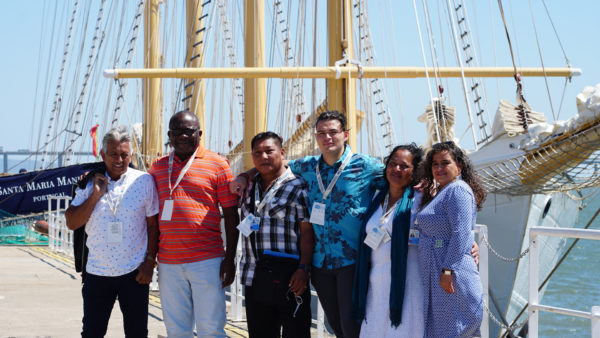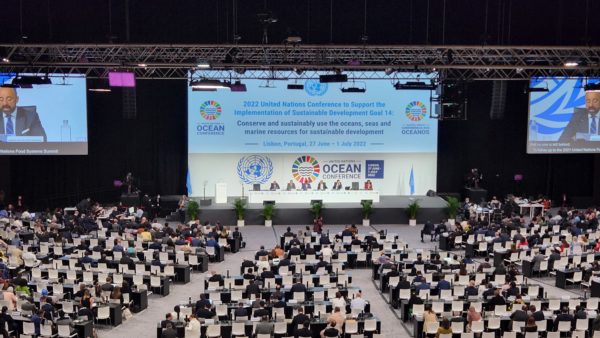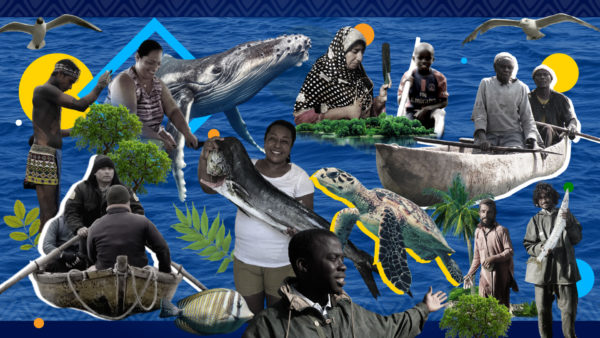The 2022 United Nations Ocean Conference was held in Lisbon, Portugal, from June 27 to July 1, 2022. The ICCA Consortium and several Members and community partners from twelve island and coastal countries attended the conference. Together, we highlighted the self-determined priorities of Indigenous and community custodians of island, coastal and marine territories of life, and of artisanal and small-scale fishers, in a conference that was otherwise focused on status quo approaches to ocean conservation and economic priorities
First published on 09/20/2022, and last updated on 06/18/2025
By ICCA Consortium
In the 2022 UN Ocean Conference, the ICCA Consortium supported the participation of various Member organizations, fishers, and representatives of Indigenous Peoples and local communities from twelve island and coastal countries. The ICCA Consortium Secretariat and Members, including CoopeSoliDar R.L., Observatorio Ciudadano, Costa Humboldt, Locally Managed Marine Area (LMMA) Network International, and Blue Ventures, worked together in the lead-up to and during the Conference to ensure the participation of Indigenous and community representatives was not only possible but also meaningful.
During the conference, together we highlighted the self-determined priorities of the island and coastal Indigenous Peoples and local communities, and small-scale fishers. In most cases, they took part in and spoke at the co-organized side events by organizations like the ICCA Consortium, Members, and partners. There were a lot of discussions during these events about self-determination, free, prior and informed consent, human-rights-based approaches to ocean conservation, just and equitable space for small-scale fisheries, and direct funding for community-led conservation.
The conference was otherwise focused on so-called “solutions”. However, these are largely rooted in exclusionary conservation, including the expansion of status-quo and top-down marine protected areas, and monetizing and privatizing ocean spaces.
The fishers and community representatives had very few opportunities to participate in the main program, including plenary sessions and interactive dialogues, which prioritized government and large conservation NGO speakers. Mainstream media coverage was quick to laud multi-million (and -billion) dollar pledges and other commitments to expand marine protected areas. However, there was little to no mention of the potential implications of such proposals for Indigenous Peoples and local communities, or acknowledgment of the growing body of international law that requires recognition of Indigenous Peoples’ and community custodians’ rights, governance systems, and customary practices in any activities that may affect them.
Although they faced several challenges and forms of exclusion during the conference, local fishers and Indigenous and community representatives came together and made their voices heard, not just in Lisbon but also around the world by sharing their stories and experiences. Their ability to rise above these challenges is a testament to their internal strength, solidarity, and the power of collective action, and this in itself should be applauded.
Side events co-organized by the ICCA Consortium and our Members
The ICCA Consortium and our Members co-organized two main side events, focused on artisanal and small-scale fisheries and coastal and marine territories of life. In addition, some of our Members such as CoopeSoliDar, LMMA Network International, and Blue Ventures co-organized or participated in other side events, including human rights, gender equity, Sustainable Development Goal 14, and bottom trawling.
Dialogues for Marine Conservation and Artisanal Small-Scale Fisheries: A Vision from Artisanal Small-Scale Fisheries, Seeking Equity, Social Justice, Sustainability, and Peace
Wednesday, June 29, 08:00-10:00, Oceanário de Lisboa
Ten representatives of Indigenous and local fishing communities spoke at this breakfast event, which was co-organized by the International Collective in Support of Fishworkers (ICSF), ICCA Consortium, SwedBio, Packard Foundation, CoopeSoliDar R.L., Costa Humboldt (ICCA Consortium Member), Environmental Defense Fund, SSF Hub, Blue Ventures (ICCA Consortium Member), LMMA Network International (ICCA Consortium Member), AWFISHNet, CAOPA, Marine Responsible Fishing Area and marine territories of life network of Costa Rica, Asociación Comunidades Indígenas Territorio Walaywe, and Comunidad Indígena Pu Wapi.
Fishers and community representatives spoke about their experiences and asked policymakers to include them in all decision-making processes that affect Indigenous and community fisheries. As the main rights-holders, knowledge holders, and custodians of aquatic territories of life, they demanded that forums like the UN Ocean Conference hear from them directly, not by proxy.
The main speakers were: Felicito Nunez, a representative of the Indigenous Garifuna in Honduras; Alfonso Simon Raylan, a fisherman from the Indigenous Gnobe Bugle in Panama; Maria Carrillo Salazar, a fisherwoman of the Marine Responsible Fishing Area of Barra del Colorado, Costa Rica; Rasinah, a women leader and representative of Indonesian Traditional Fishermen’s Union (KNTI); Lavenia Naivalu, a fisherwoman and Fiji’s Nacula District Spokesperson and representative of LMMA Network International; Gaoussou Gueye, President of Confédération Africaine des Organisations de Pêche Artisanale (CAOPA), Senegal; Yohana Coñuecar, a fisherwoman and representative of Asociación Comunidades Indígenas Territorio Walaywe, Chile; Daniel Caniullán, the Head (Lonko) of Comunidad Indígena Pu Wapi, Chile; and Rolando Ramirez, a fisherman and representative of Marine Responsible Fishing Area 201, Costa Rica.
Franz Tattenbach Capra, the Minister of Environment and Energy of Costa Rica, Luciano Hiriart-Bertrand, the Executive Director of Costa Humboldt, Chile; German Pochet, a lawyer with Gentes del Mar, Costa Rica; Spurgeon Miller, the Mayor of Guanaja Municipality, Honduras; Meg Caldwell, Deputy Director, David Lucile and Packard Foundation; Annie Tourette, Head of Advocacy, Blue Ventures; and Vivienne Solis Rivera of CoopeSoliDar R.L., Costa Rica, among others, also spoke at the dialogue.
A call to action from artisanal fishing communities, vital users of the oceans: formal presentation and dialogue
Tuesday, June 28, 08:30-09:30 (Oceanário de Lisboa) and 09:45-10:45 (Ocean Base Camp in the Marina do Parque das Nações)
ICCA Consortium Members Blue Ventures and CoopeSoliDar R.L., along with others, organized a side event to officially launch “the call to action from small-scale fishers”. Representatives of fishing communities from around the world spoke at the first part of the event, the formal presentation, where they called for urgent action to restore small-scale fisheries and recognize the rights of Indigenous Peoples and local communities and their contributions to ocean health. During the second part of the event, the small-scale fishers engaged in a dialogue with conservation NGOs and other civil society organizations to seek support for the call to action.
Fishers and community representatives who addressed the launch event and later the opening dialogue, open others, included: Gaoussou Gueye, President of Confédération Africaine des Organisations de Pêche Artisanale (CAOPSA); Felicito Nunez, a representative of the Indigenous Garifuna in Honduras; Maria Carrillo, a fisherwoman of the Marine Responsible Fishing Area of Barra del Colorado, Costa Rica; Lavenia Naivalu, Fiji’s Nacula District Spokesperson and representative of LMMA Network, Fiji; and Aaron Chacon, a young fisherman from the Marine Responsible Fishing Area Tarcoles, Costa Rica. In addition, the Minister of Fisheries and Aquaculture Development of Ghana, Mavis Hawa Komsoon, spoke at the event and expressed her support for the call to action.
Participation in official sessions hampered by lack of inclusion and accessibility
The fishers and community representatives participated in the main program of the 2022 UN Ocean Conference by listening to plenary and dialogue sessions. However, this participation was arguably neither meaningful nor effective due to lack of inclusion and lack of interpretation support – a key aspect of accessibility in international fora.
First, the community representatives had very few opportunities to actually speak and have their voices heard in the official conference sessions. In one of very few such opportunities, with the preparatory support of CoopeSoliDar, Josefina Mata Ceja of the Boca de Camichin community of Nayarit (community partner of Nuiwari AC, ICCA Consortium Member), Mexico, and Adama Djaló, a woman fish processor from Guinea Bissau, spoke in the interactive dialogue on: “making fisheries sustainable and providing access for small-scale artisanal fishers to marine resources and markets”.
Josefina Mata Ceja spoke about the importance of fishing communities’ participation, and specifically the participation of women, in the fisheries sector and in decision-making about aquatic conservation. She urged decision-makers to build primary infrastructures in fish processing centers and provide basic services such as drinking water, sanitation, and daycares for children. She said that decent housing and living conditions are needed for women in fisheries and their families, and that ocean conservation can only be achieved with gender equality, women’s participation, intersectional human rights, and social inclusion.
Secondly, we had reasonably expected the official conference sessions to have simultaneous interpretation in the main UN languages since it was a major UN event, years in the making, and in a location with professional conference facilities. However, no interpretation was provided in the official conference sessions or in most side events, including those organized by international NGOs with large delegations. The lack of interpretation created a significant barrier to the meaningful and effective participation of not only the local fishers and community representatives, but also for many other delegates who are not comfortable communicating in English. This calls into serious question the commitment of the UN and Ocean Conference organizers to accessibility and inclusion, particularly of people from the Global South.
Anticipating the central importance of linguistic support in Lisbon, the ICCA Consortium organized live interpretation between English, Spanish, and French for several preparatory meetings and side events so that community and grassroots delegates could communicate with each other and with other participants. We are grateful to the interpreters, Xaviera Elorza Salinas, Juan Luis Cobano Jimenez, Saoussen Khalifa, Sterling Ellsworth, and Miguel Guardado Albarreal, for their high-quality and compassionate support for our delegation. Had we known in advance that the UN organizers would not provide interpretation during the main conference sessions, we would have at least tried to provide this for our delegation as well.
The broader point remains, however, that professional interpretation should have been provided in all UN languages during the UN Ocean Conference. This compounded the effects of the overarching exclusion of community representatives in the main conference sessions and arguably contributed to the lack of representation of Indigenous Peoples’ and local communities’ perspectives, concerns, and recommendations in the conference’s main policy outcome document.
UN Ocean Conference outcome document: a political declaration devoid of meaningful commitments for the people of the sea
During his opening speech, the UN Secretary-General warned the world about an ‘ocean emergency’ and said, “We must protect the oceans and the people whose lives and livelihoods depend on them, from the impacts of climate change.”
Despite these inspiring words, the closing declaration, as the main policy outcome of the conference, largely ignores them – and the Indigenous Peoples and local communities who are playing an outsized role in sustaining, conserving, and defending island, coastal and marine territories of life around the world. The declaration does not address the main drivers of biodiversity loss and fails to reflect the messages put forward by artisanal and small-scale fishers and Indigenous and community custodians of the sea before and during the conference and its side events. Overall, it ignores the central roles of Indigenous Peoples and local communities as the main proponents and leaders of ocean conservation. Instead, the declaration includes calls such as “scaling up ocean action based on science and innovation of Goal 14: stocktaking, partnerships, and solutions with the participation of civil society and other relevant stakeholders”.
Although it calls for ‘‘collaborative processes for decision-making that include all stakeholders, including small-scale and artisanal fisheries,’’ the conference itself excluded small-scale and artisanal fishers from its official sessions. Crucially, the declaration also fails to recognize Indigenous Peoples and community custodians of the ocean and artisanal and small-scale fishers as rights-holders, rather than mere stakeholders.
The declaration, titled “Our ocean, our future, our responsibility”, rightly recognizes the ‘‘important role of indigenous, traditional, and local knowledge, innovation and practices held by indigenous peoples and local communities’’ in ocean conservation. But it fails to recognize and promote the human rights of these communities or commit to upholding their rights to pursue self-determined governance in their aquatic territories of life.
READ MORE: “U.N. Ocean Conference ends with promises. Is a sea change coming?” – Mongabay (July 1, 2022)
Supporting Indigenous and community custodians to share their experiences and build solidarity
As a membership-based association, the ICCA Consortium’s role was to enable our Members and Indigenous and community representatives of territories of life to share their experiences and self-determined priorities directly with decision-makers at the UN Ocean Conference. This included various forms of support for community representatives to prepare for and participate in the conference, including organizing exchanges and providing logistical, communications, and linguistic support to identify their priority topics, issues, concerns, and solutions they wanted to highlight in Lisbon and share them through video messages, and amplify them through online channels.
During the conference in Lisbon, we asked the participants from fishing and coastal communities for their opinions on how a global forum like the UN Ocean Conference should recognize and include them as rights-holders in coastal and marine areas, and for suggestions for future UN Ocean Conferences.
Aaron Chacon from Costa Rica said the UN Ocean Conference was a ‘bittersweet’ experience. He said that he was happy to be part of this global meeting and that at least some of the people listened to fishers during several of the side events. But in his view, the main problem was that the conference organizer, the UN, did not even consider that fishers might want to participate in the meeting. That was evident to him in so many ways during the conference, to the point where he sometimes felt ‘invisible’.
This is a very telling experience and observation that in many ways cuts to the heart of community delegates’ concerns. The UN Ocean Conference is a major forum on coastal and marine issues and seeks to find solutions and build political will to collectively address some of the world’s most pressing challenges. The continued exclusion of Indigenous Peoples and local communities – key rights-holders and caretakers of islands, coasts and oceans and the diverse life within them – from global fora like the UN Ocean Conference does not bode well for the future of our planet.
Community fishers make an impact despite challenges
Despite many challenges, Indigenous and local participants were present and made important contributions to the conference and side events. Their very presence in such a contested space made an impact on others. This kind of organized participation of fishers in a UN conference was noted by others, and it helped promote better recognition of their rights and more holistic conservation of our aquatic ecosystems.
In future conferences, the participation of artisanal and small-scale fishers and Indigenous and community custodians of the sea must not be limited to side events. They have a right to be at the table in such UN conferences’ main sessions and decision-making spaces, where important plans are being prepared, declarations issued, and commitments made that impact their lives and territories.
These communities are rights-holders – not mere stakeholders – and they must be recognized and respected as such in multilateral fora such as the UN Ocean Conference. There is a groundswell of recognition of the rights, roles, and contributions of Indigenous Peoples and local communities to sustaining and defending a healthy planet for all, including islands, coasts, and oceans, and the diversity of life within them. Advocates and allies are needed among conservationists, funders, government officials and policymakers, journalists, lawyers, and more to help create and hold space for these rights-holders to speak for themselves in the many decision-making processes that affect them.
Acknowledgments
ICCA Consortium Members who participated in the UN Ocean Conference and supported community representatives to participate: CoopeSoliDar R.L, Observatorio Ciudadano, Costa Humboldt, Nuiwari A.C., LMMA Network International, MIHARI, Blue Ventures
Participants supported by the ICCA Consortium and/or by our Members:
- Felicito Nunez, representative of Garifuna Indigenous People (community partner of CoopeSoliDar R.L., ICCA Consortium Member), Honduras
- Josefina Mata Ceja, fisherwoman, and representative of Comunidad Boca de Camichin (community partner of Nuiwari AC, ICCA Consortium Member), Nayarit, Mexico
- Alfonso Simon Raylan, representative of Gnobe Bugle Indigenous People (community partner of CoopeSoliDar R.L., ICCA Consortium Member), Panama
- Maria Carrillo Salazar, fisherwoman from Marine Responsible Fishing Area of Barra del Colorado (Community partner of CoopeSoliDar R.L., ICCA Consortium Member), Costa Rica
- Patricio Colivoro, a speaker (Werken) of Comunidad Indígena Yaldad (community partner of ICCA Consortium Members Observatorio Ciudadano and Costa Humboldt), Chile
- Lavenia Naivalu, fisherwoman and spokesperson of Nacula District, Fiji, and a representative of LMMA Network International (ICCA Consortium Member), Fiji
- Yohana Coñuecar, a representative of Asociación Comunidades Indígenas Territorio Walaywe (community partner of ICCA Consortium Members Observatorio Ciudadano and Costa Humboldt), Chile
- Daniel Caniullán, fisherman and the Head (Lonko) of Comunidad Indígena Pu Wapi, Chile
- Aaron Chacon, fisherman from the Marine Responsible Fishing Area Tarcoles, Costa Rica
- Rolando Ramirez, fisherman and representative of Marine Responsible Fishing Area 201, Costa Rica
- Gaoussou Gueye, President, CAOPA (community partner of Blue Ventures, ICCA Consortium Member), Senegal
- Rasinah, a women leader and representative of the Indonesian Traditional Fishermen’s Union – KNTI (community partner of Blue Ventures, ICCA Consortium Member), Indonesia
- German Pochet, Gentes del Mar (CSO partner of CoopeSoliDar R.L., ICCA Consortium Member), Costa Rica
- Luciano Hiriart-Bertrand, Executive Director, Costa Humboldt (ICCA Consortium Member), Chile
- Vivienne Solis Rivera, CoopeSoliDar R.L. (ICCA Consortium Member), Costa Rica
- Annie Tourette, Head of Advocacy, Blue Ventures (ICCA Consortium Member)
- Marvin Fonseca, CoopeSoliDar R.L. (ICCA Consortium Member), Costa Rica
- Hugh Govan, Technical Advisor, LMMA Network International (ICCA Consortium Member)
- Flora McMorrin, Senior Advocacy Adviser, Blue Ventures (ICCA Consortium Member)
- Alasdair Harris, Blue Ventures (ICCA Consortium Member)
- Mohammad Arju, Communications Coordinator, ICCA Consortium
We are very grateful to the Packard Foundation and Oak Foundation for their generous support for several members of our delegation and related communications and linguistic support for their participation in the UN Ocean Conference.



